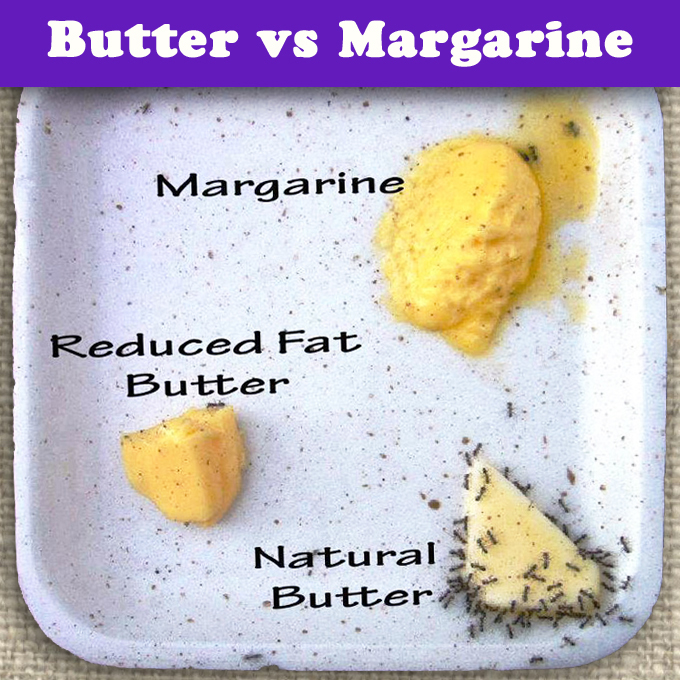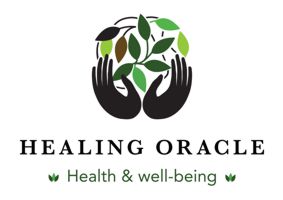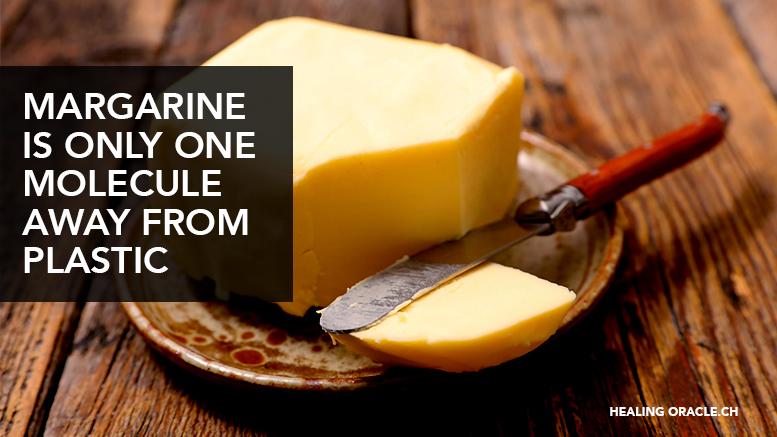Use RAW organic butter (NOT pasteurised) if you are going to use anything at all! Margarine is toxic/acidic/calcification forming and only one molecule away from being classified as a plastic.
Butter was demonized for a while, due to the high saturated fat content and various health experts started promoting margarine instead. Back in the day, margarine used to be high in trans fats. These days, it has less trans fats than before, but is still loaded with refined vegetable oils.

Margarine is not food… it is an assembly of chemicals and refined oils that have been made to look and taste like food. Made from Hydrogenated Oils (Trans Fats) that are also found in a variety of snack and processed foods, this ingredient comes to pass through extensive processing, until it becomes 1 molecule removed from plastic.
It is extremely damaging to your cardiovascular system and needs to be cut out completely.
Not surprisingly, the Framingham Heart Study showed that people who replace butter with margarine are actually more likely to die from heart disease. In fact, recommending trans fat laden margarine instead of natural butter may just be the worst nutrition advice in history.
The History of margarine
Margarine started out in Turkey feed. The Turkeys were losing too much weight and dying, so they stopped using it for turkeys. But they had an excess of it, so it ended up in the food industry instead.
Please see this related article for what to do with a clogged lymphatic system and the truth about the Cholesterol Myth
Raw Butter is better
If you want to improve your health, eat real butter (preferably made from grass-fed cows) and is not pasteurised, as this process has become so heavily industrialised that the end result does not resemble real, raw milk at all.
This is what Healthline have to say about butter:
One tablespoon (14 grams) of butter provides the following nutrients (1):
- Calories: 102
- Total fat: 11.5 grams
- Vitamin A: 11% of the Reference Daily Intake (RDI)
- Vitamin E: 2% of the RDI
- Vitamin B12: 1% of the RDI
- Vitamin K: 1% of the RDI
Although butter is high in calories and fat, it contains a variety of important nutrients as well.
For example, it’s a good source of vitamin A, a fat-soluble vitamin needed for skin health, immune function, and healthy vision.
It also contains vitamin E, which supports heart health and acts as an antioxidant to protect your cells against damage caused by molecules called free radicals
Additionally, butter contains very small amounts of other nutrients, including riboflavin, niacin, calcium, and phosphorus.
Butter is rich in nutrients and beneficial compounds like butyrate and conjugated linoleic acid.
High-fat dairy products like butter have been linked to a reduced risk of obesity, diabetes, and heart problems.
Still, butter is high in calories and saturated fat and should be enjoyed in moderation. It’s best to consume it alongside a mix of heart-healthy fats like olive oil, avocado, nuts, seeds, and fatty fish.
Despite its longstanding reputation as an unhealthy ingredient, most research shows that butter can be included in moderation as part of a balanced diet and may even be associated with several health benefits.
For example, one review of 16 studies found that higher intake of high-fat dairy foods like butter was tied to a decreased risk of obesity
Another large review in more than 630,000 people reported that each serving of butter was associated with a 4% lower risk of type 2 diabetes
Not only that, but other research shows that eating moderate amounts of dairy foods like butter may be linked to a lower risk of heart attack and stroke as well
Source: Healthline
Love and Light
Healing Oracle
—
Love and Light
The Healing Oracle Team
Please join our growing numbers on MeWe: Healing Oracle
Also join us on Twitter | YouTube
Global Petition
Please sign our global petition against enforced vaccinations The intention of this petition is to present 5 million signatures to each President, Prime Minister, Health Minister and heads of state worldwide.
Vaccines are a global problem and need to be tackled on a global level.
If we stand as one, we have a chance of saving the children of the future.

